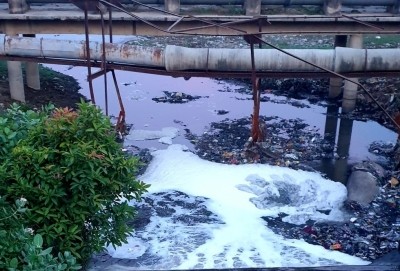
New Delhi, Expressing concern over the continuing serious pollution in the Periyar river of Kerala and its consequences on public health and the environment, the National Green Tribunal observed that pollution is a "crime against humanity" and the "victims are poor voiceless people".
"Pollution is crime against humanity and under law of the land. Right to clean environment is part of Right to Life. As already noted, large number of deaths and diseases are attributable to it. Most of the victims are poor voiceless people. Even if victims are poor and helpless, no State under the Constitution can show apathy and pay lip sympathy to the issue inspite of binding Court orders...," NGT Chairperson Justice Adarsh Kumar Goel-led bench said in a recent order.
The bench was dealing with three similar complaints over the pollution of the Periyar river, the longest river in the state which is also known as "the lifeline of Kerala".
Pulling up the state government, the green court said, "Reports of the authorities during the last several years do not show improvement in water quality of the River Periyar at any of the locations in question. It is not clear whether the river water is fit for bathing purpose, with Fecal Coliform counts being within acceptable level."
Pointing out that the river which is adjoining the Arabian Sea in its last phase through the city of Cochin, the commercial capital of the state, the tribunal noted that the Greater Kochi (Udyogamandal) is one of the critically polluted industrial area, having Comprehensive Environmental Pollution Index (CEPI) at 52.94 (2018).
"This certainly necessitates that the industries are compelled to adopt Zero Liquid Discharge (ZLD). Further, Periyar River in Kerala falls in the list of identified polluted river stretches under 'Priority-V' category Aluva-Eloor to Kalamassery to Kalamassery, having BOD (Biochemical Oxygen Demand) range between 3-6.0 mg/l," stated the order.
The green court also pointed out the earlier action plan of May 2019, saying it identified short-term and long-term actions but there is no mention of execution of the said plan.
"Such execution must be expedited without further delay on the pretext of non-availability of funds or non identification of executing agencies. Since discharge of untreated sewage into the river is a criminal offence under the Water Act, the same must be stopped forthwith. River must meet standard of atleast Class-B designated best use classification of CPCB. Plea that Kerala being high rain-fed area does not require any solution untenable," the order stated.
The tribunal, while noting the long pending complaints over a decade, said that since all issues related to the river pollution stand identified and there are binding directions of the Supreme Court and the Tribunal to enforce the State's obligation to provide clean environment to citizens, no purpose will be served by endless proceedings before the Tribunal.
It is high time that the State takes over its responsibility and higher level monitoring mechanism is evolved, the green court averred.
Accordingly, the tribunal directed the Chief Secretary, Kerala to constitute a monitoring committee comprising of four Additional Chief Secretaries of concerned Departments - Environment, Local Self government, Irrigation/Water Resource and Finance.
The Additional Chief Secretary, Environment will be the Coordinator. The Committee may hold its first meeting within two weeks to take stock of the situation of execution of action plan with time-bound targets. Progress on such targets must be reviewed atleast once in a month, the order said.


.jpeg)

